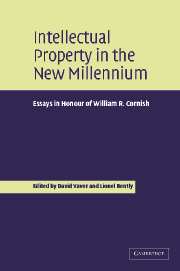Book contents
- Frontmatter
- Contents
- List of contributors
- Foreword
- Preface
- General intellectual property
- Patents and plant protection
- Trade marks and unfair competition
- Copyright, moral and neighbouring rights
- 15 The Berne Convention: the continued relevance of an ancient text
- 16 The (new?) right of making available to the public
- 17 Private copy licence and levy schemes: resolving the paradox of civilian and common law approaches
- 18 Paternalism and autonomy in copyright contracts
- 19 Criminality and copyright
- 20 Towards new forms of neighbouring rights within the European Union?
- William R. Cornish – curriculum vitae
- Index
16 - The (new?) right of making available to the public
Published online by Cambridge University Press: 25 May 2010
- Frontmatter
- Contents
- List of contributors
- Foreword
- Preface
- General intellectual property
- Patents and plant protection
- Trade marks and unfair competition
- Copyright, moral and neighbouring rights
- 15 The Berne Convention: the continued relevance of an ancient text
- 16 The (new?) right of making available to the public
- 17 Private copy licence and levy schemes: resolving the paradox of civilian and common law approaches
- 18 Paternalism and autonomy in copyright contracts
- 19 Criminality and copyright
- 20 Towards new forms of neighbouring rights within the European Union?
- William R. Cornish – curriculum vitae
- Index
Summary
I am honoured to contribute to this Festschrift for Bill Cornish, the leading exponent of the English (even if many of them are in fact Anzacs) School of Copyright and Intellectual Property. In addition to greatly valuing his scholarship, I hold Bill in especial esteem for his unswerving sanity in ALAI meetings, and for the piano duets in which he occasionally indulges my spouse. The following essay is offered in the spirit of international inquisitiveness that has animated so many of my contacts with Bill.
Introduction
The Berne Convention 1971 Paris Act covered the right of communication to the public incompletely and imperfectly through a tangle of occasionally redundant or self-contradictory provisions on ‘public performance’; ‘communication to the public’, ‘public communication’, ‘broadcasting’, and other forms of transmission. Worse, the scope of rights depended on the nature of the work, with musical and dramatic works receiving the broadest protection, and images the least; literary works, especially those adapted into cinematographic works, lying somewhere in between. The 1996 WIPO Copyright Treaty (here after, WCT) rationalized and synthesized protection by establishing full coverage of the communication right for all protected works of authorship. The WCT also introduced a new designation, the ‘right of making available to the public’. This right corresponds to much communication of works over the Internet, whose users ‘access these works from a place and at a time individually chosen by them’ (WCT, Article 8).
- Type
- Chapter
- Information
- Intellectual Property in the New MillenniumEssays in Honour of William R. Cornish, pp. 234 - 247Publisher: Cambridge University PressPrint publication year: 2004
- 5
- Cited by



